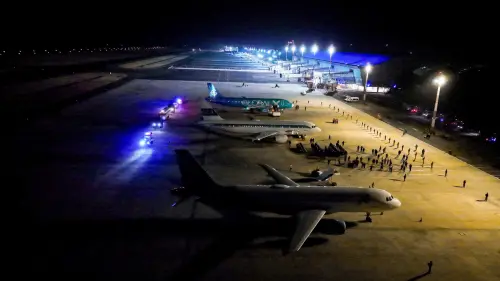President’s administration's response to a judicial request for more details regarding the timing of deportation flights carrying hundreds of Venezuelan migrants was deemed "woefully insufficient" by a judge, who accused officials of evading their obligations under his previous order.
U.S. District Judge Boasberg is assessing whether administration officials violated his March 15 order concerning the expulsions. In a new directive, he instructed Justice Department officials to clarify by next Tuesday why the administration's failure to bring the deported migrants back to the United States did not breach his order.
This development escalates the judge's conflict with the administration, raising concerns among critics and some legal experts about potential repercussions should the administration disregard judicial rulings. The U.S. Constitution establishes the executive and the judiciary as co-equal branches of government alongside Congress, ensuring a system of checks and balances.
Boasberg criticized the administration for "evading its responsibilities" in its responses to his inquiries about the flight timings. The administration's reply, submitted by an Immigration and Customs Enforcement (ICE) official and kept from public view, repeated information previously disclosed about the flights and did not address whether the government would invoke the legal doctrine of state secrets to withhold further details. Instead, the ICE official indicated that unidentified cabinet secretaries were still deliberating on whether to claim this privilege, adding that the 24-hour window he provided for a response was inadequate for a matter of national security.
"This is woefully insufficient," the judge remarked.
He had previously expressed doubt about the applicability of the state secrets doctrine, noting that U.S. Secretary of State Marco Rubio had shared details of the deportation flights on social media. While it is standard for sensitive material to be submitted to judges privately, Boasberg pointed out that the administration had indicated some information could be made public.
Previously, he sought to determine if the administration violated his orders while allowing officials an opportunity to provide additional details about the flights. Thursday marked the first instance in which the judge directly instructed officials to address whether they had breached his order, issuing what is known as an order to show cause.
On Tuesday, Trump called for Boasberg's impeachment—a rare move that elicited a rebuke from Chief Justice John Roberts. Trump asserted that he was acting on voters’ wishes and labeled Boasberg a "Radical Left Lunatic."
Boasberg, confirmed by the Senate in 2011 with a bipartisan 96-0 vote, had earlier imposed a two-week ban on deportations under Trump's invocation of the 1798 law, which Trump claimed allowed him to deport alleged members of the Venezuelan gang Tren de Aragua without final orders from immigration judges. However, Boasberg determined that the law did not support the president's assertion that the gang's presence in the U.S. constituted an act of war.
After Boasberg's order was made public, three planes carrying deportees arrived in El Salvador, where the migrants are held under an agreement with President Nayib Bukele's government.
In recent court filings, the American Civil Liberties Union, which challenged the invocation of the Alien Enemies Act, cited cases of five Venezuelan migrants who were reportedly mislabeled as gang members before being deported to El Salvador.
Among those deported was Jerce Reyes Barrios, a Venezuelan professional soccer player and youth coach with an ongoing U.S. asylum case. His attorney stated in a sworn declaration that the Department of Homeland Security had erroneously classified him as a gang member due to a crown tattoo, which referenced his favorite soccer team, Real Madrid. Barrios was listed among 238 Venezuelan deportees sent to El Salvador, as reported by CBS News.
